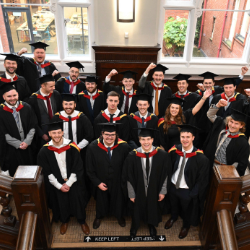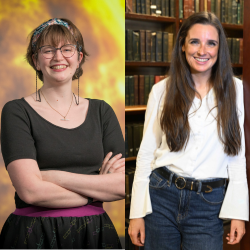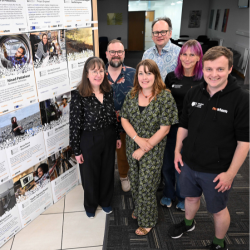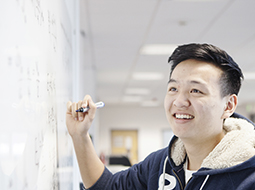-
Study
-
Quick Links
- Open Days & Events
- Real-World Learning
- Unlock Your Potential
- Tuition Fees, Funding & Scholarships
- Real World Learning
-
Undergraduate
- Application Guides
- UCAS Exhibitions
- Extended Degrees
- School & College Outreach
- Information for Parents
-
Postgraduate
- Application Guide
- Postgraduate Research Degrees
- Flexible Learning
- Change Direction
- Register your Interest
-
Student Life
- Students' Union
- The Hub - Student Blog
- Accommodation
- Northumbria Sport
- Support for Students
-
Learning Experience
- Real-World Learning
- Research-enriched learning
- Graduate Futures
- The Business Clinic
- Study Abroad
-
-
International
International
Northumbria’s global footprint touches every continent across the world, through our global partnerships across 17 institutions in 10 countries, to our 277,000 strong alumni community and 150 recruitment partners – we prepare our students for the challenges of tomorrow. Discover more about how to join Northumbria’s global family or our partnerships.
View our Global Footprint-
Quick Links
- Course Search
- Undergraduate Study
- Postgraduate Study
- Information for Parents
- London Campus
- Northumbria Pathway
- Cost of Living
- Sign up for Information
-
International Students
- Information for International Students
- Northumbria and your Country
- International Events
- Application Guide
- Entry Requirements and Education Country Agents
- Global Offices and Regional Teams
- English Requirements
- English Language Centre
- International student support
- Cost of Living
-
International Fees and Funding
- International Undergraduate Fees
- International Undergraduate Funding
- International Masters Fees
- International Masters Funding
- International Postgraduate Research Fees
- International Postgraduate Research Funding
- Useful Financial Information
-
International Partners
- Agent and Representatives Network
- Global Partnerships
- Global Community
-
International Mobility
- Study Abroad
- Information for Incoming Exchange Students
-
-
Business
Business
The world is changing faster than ever before. The future is there to be won by organisations who find ways to turn today's possibilities into tomorrows competitive edge. In a connected world, collaboration can be the key to success.
More on our Business Services-
Business Quick Links
- Contact Us
- Business Events
- Research and Consultancy
- Education and Training
- Workforce Development Courses
- Join our mailing list
-
Education and Training
- Higher and Degree Apprenticeships
- Continuing Professional Development
- Apprenticeship Fees & Funding
- Apprenticeship FAQs
- How to Develop an Apprentice
- Apprenticeship Vacancies
- Enquire Now
-
Research and Consultancy
- Space
- Energy
- AI Futures
- CHASE: Centre for Health and Social Equity
- NESST
-
-
Research
Research
Northumbria is a research-rich, business-focused, professional university with a global reputation for academic quality. We conduct ground-breaking research that is responsive to the science & technology, health & well being, economic and social and arts & cultural needs for the communities
Discover more about our Research-
Quick Links
- Research Peaks of Excellence
- Academic Departments
- Research Staff
- Postgraduate Research Studentships
- Research Events
-
Research at Northumbria
- Interdisciplinary Research Themes
- Research Impact
- REF
- Partners and Collaborators
-
Support for Researchers
- Research and Innovation Services Staff
- Researcher Development and Training
- Ethics, Integrity, and Trusted Research
- University Library
- Vice Chancellors Fellows
-
Research Degrees
- Postgraduate Research Overview
- Doctoral Training Partnerships and Centres
- Academic Departments
-
Research Culture
- Research Culture
- Research Culture Action Plan
- Concordats and Commitments
-
-
About Us
-
About Northumbria
- Our Strategy
- Our Staff
- Our Schools
- Place and Partnerships
- Leadership & Governance
- University Services
- Northumbria History
- Contact us
- Online Shop
-
-
Alumni
Alumni
Northumbria University is renowned for the calibre of its business-ready graduates. Our alumni network has over 253,000 graduates based in 178 countries worldwide in a range of sectors, our alumni are making a real impact on the world.
Our Alumni - Work For Us
25th January 2023 (ELA102b)
Sergey Dyachenko, Department of Mathematics, University at Buffalo.
Instabilities of almost limiting Stokes waves
Abstract:
The Stokes wave is a water wave that travels over a free surface of water without changing shape. When a time-varying fluid domain is mapped to a fixed geometry, such as a periodic strip in the lower half-plane, the equation for the Stokes wave is a nonlinear integro-differential ODE whose solutions are found numerically to arbitrary precision. The spectral stability of Stokes waves is studied by linearization of the equations of motion for the free surface around a Stokes wave, and studying the spectrum of the associated Fourier-Floquet-Hill (FFH) eigenvalue problem. We developed a novel approach to studying the eigenvalue spectrum by combining the conformal Hamiltonian canonical variables, the FFH technique built into a matrix-free Krylov-Schur eigenvalue solver. We report new results for the Benjamin-Feir instability as well as the high-frequency, and localized (superharmonic) instabilities of the waves close to the limiting Stokes wave.
15th February 2023 (ELA002)
Timm Kruger, University of Edinburgh.
Formation and stability of pairs of particles in inertial microfluidics
Abstract:
Inertial particle microfluidics is an emerging technology for microfluidic particle separation and manipulation. Some applications, such as flow cytometry and cell encapsulation, require the formation of stable particle trains with consistent inter-particle spacing along the flow axis. In order to understand the formation and properties of particle trains, we have investigated the formation and stability of the simplest case of particle trains - particle pairs - in straight channels under mild inertia through immersed-boundary-lattice-Boltzmann-finite-element simulations. We found that initial conditions, particle softness and size heterogeneity play important roles in the formation and stability of particle pairs. Our results demonstrate that all these factors must be considered in the design of inertial microfluidic devices for manipulating inter-particle spacing.
22nd February 2023 (ELA002)
Maia Angelova, Data Analytics Research Lab, School of Information Technology, Deakin University, Melbourne Burwood Campus.
Data-driven models for precision healthcare
Abstract:
In this talk, I will share our latest research and describe how our data-driven models, based on physical and physiological data, can assist in the early detection of insomnia and diabetes and provide a robust basis for pre-screening of individuals with wearable devices. I will consider the following case studies based on our most recent projects: (a) Glucose-insulin regulation models: glucose-insulin dynamics is central for understanding the regulation mechanisms between different organs in the human body and is key to maintain healthy life and prevent diabetes. We combine dynamical systems approach with machine learning algorithms to model the regulation between glucose and insulin and predict glucose dynamics and insulin utilisation in healthy and pre-diabetic regimes [1,2]; (b) Classification of chronic back pain from multi-modal data: we use image, questionnaires and physical activities data to classify chronic low back pain [3]. (c) Classification of insomnia and sleep from physical activities (actigraphy) data. Our models can distinguish acute from chronic insomnia and healthy sleep [4-6]. They provide a robust basis for pre-screening of insomnia with wearable devices in a home environment.
References:
- Angelova, M., Beliakov, G., Ivanov, A. Shelyag, S. 2021. Global stability and periodicity in a glucose-insulin regulation model with a single delay. CNSNS 95, 105659, https://doi.org/10.1016/j.cnsns.2020.105659.
- Huard, B., Bridgewater, A. and Angelova, M. 2017. Mathematical investigation of diabetically-impaired ultradian oscillations in the glucose-insulin regulation. J Theor Biol 418: 66-76, doi:10.1016/j.jtbi.2017.01.039.
- Tagliaferri, S.D., Wilkin, T., Angelova, M. et al. Chronic back pain sub-grouped via psychosocial, brain and physical factors using machine learning. Sci Rep 12, 15194 (2022). https://doi.org/10.1038/s41598-022-19542-5.
- Rani, S., Shelyag, S., Karmakar, C., Zhu, Ye, Fossion, R., Ellis, Jason, Drummond, S. P. A. and Angelova, M. (2022) Differentiating acute from chronic insomnia with machine learning from actigraphy time series data. Frontiers in Network Physiology, 2. p. 1036832. ISSN 2674-0109.
- M. Angelova, C. Karmakar, Y. Zhu, S. P. A. Drummond and J. Ellis, ""Automated Method for Detecting Acute Insomnia Using Multi-Night Actigraphy Data,"" in IEEE Access, vol. 8, pp. 74413-74422, 2020, doi: 10.1109/ACCESS.2020.2988722.
- Kusmakar, Shitanshu, et al. ""A machine learning model for multi-night actigraphic detection of chronic insomnia: development and validation of a pre-screening tool."" Royal Society open science 8.6 (2021): 202264, https://doi.org/10.1109/TBME.2018.2845865.
8th March 2023 (SAN 313)
Thibault Bonnemain, Kings College London.
Quadratic mean field games: Schrödinger and electrostatic representations
Abstract:
Mean Field Games provide a powerful theoretical framework to deal with stochastic optimization problems involving a large number of coupled subsystems. They can find applications in several fields, be it finance, economics, sociology, engineering ... Though these models are much simpler than the underlying differential games they describe in some limit, their precise behaviour is not yet fully understood. After introducing the basic tenets of the formalism, I will focus on a toy model from a particular class of games, for which there is a deep connection between the associated system of PDEs and the nonlinear Schrödinger equation. This allows me to identify limiting regimes that can be dealt with explicitly. In particular one such regime yields insight on the intrinsic forward-backward structure of Mean Field Games through a mapping to an electrostatic problem.
15th March 2023 (ELA002)
Casper Oelen, Department of Mathematical Sciences, Loughborough University.
Automorphic Lie algebras on complex tori
Abstract:
An automorphic Lie algebra is a Lie algebra of certain invariants, initially arising in the theory of integrable systems, or more specifically, in the context of algebraic reduction of Lax pairs. They are defined as follows. Let a finite group G act on a compact Riemann surface and on a complex finite dimensional Lie algebra g, both by automorphisms. Consider the space of meromorphic maps from the Riemann surface to the Lie algebra with poles restricted to an orbit of G. The subspace of G-equivariant maps is an automorphic Lie algebra. It is an infinite dimensional Lie algebra over the complex numbers and it can be seen as a generalisation of the famous Onsager algebra. We present a classification for g = sl2(C), in which case it turns out that G can be naturally restricted to be cyclic, dihedral or the alternating group on four symbols. We shall give a construction of normal forms for the case of g=sl2(C), which is one of the key elements in the proof of the classification result. Finally, we will mention some applications to integrable systems. This talk is based on my PhD thesis, supervised by Sara Lombardo and Vincent Knibbeler.
29th March 2023 (ELA002)
Thomas Bothner, School of Mathematics, University of Bristol.
Abstract:
19th April 2023 (ELA002)
Tom Bridges, Department of Mathematics University of Surrey.
Superharmonic instability and water wave breaking
Abstract:
Get an insight into life at Northumbria with videos and 360 panoramas of the Department of Mathematics, Physics and Electrical Engineering
Latest News and Features

First cohort of Civil Engineering Degree Apprentices graduate from Northumbria
The inaugural cohort of Civil Engineering degree apprentices have graduated from Northumbria…

Space sector growth in the UK under spotlight at major industry event
The role the space sector is playing in driving economic growth in the UK was highlighted this…

Northumbria University STEM outreach project wins Institute of Physics award
Researchers from an outreach group at Northumbria University are celebrating after winning…

Northumbria researchers announced as winners of Future Leaders Fellowships
Two talented researchers from Northumbria University have been awarded a share of £120 million…

Northumbria expands results day support for students
Northumbria University is expanding and enhancing the support it provides to students receiving…

OLED materials have potential new uses in detecting pesticides for the farming industry
Researchers are set to shine a different kind of light on the farming industry after receiving…

Northumbria STEM outreach project marks major milestone
An outreach group from Northumbria University is celebrating a decade of STEM engagement in…

CubeSat mission a step closer to blast off as industry invited to join final push into orbit
A consortium of academic and industry partners has come a step closer to launching the UK’s…



